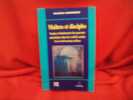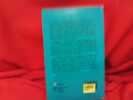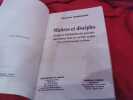-
Type
Autograph (1)
Book (54147)
Magazine (289)
Manuscript (2)
Maps (1)
New book (1)
Old papers (1)
Photographs (1)
-
Latest
Last 24h (187)
Last 3 days (187)
Last month (573)
Last week (129)
-
Language
Dutch (2)
English (30)
Finnish (1)
French (54338)
German (15)
Greek (5)
Italian (17)
Japanese (2)
Latin (20)
Polish (1)
Portuguese (2)
Russian (1)
Spanish (7)
Swedish (2)
-
Century
16th (66)
17th (201)
18th (1284)
19th (3684)
20th (22734)
21st (3868)
-
Countries
Belgium (6751)
Brazil (28)
Canada (6)
China (2)
Côte d'Ivoire (63)
Denmark (1017)
France (41723)
Germany (4)
Greece (3)
Italy (55)
Netherlands (281)
Switzerland (4509)
United States of America (1)
-
Syndicate
ALAC (6)
CLAM (4)
CNE (12)
ILAB (22138)
NVVA (1010)
SLACES (918)
SLAM (19853)
SNCAO (41)
L'euthanasie.
Nancy, la Revue Médicale, 1951 ; in-8, 18 pp., broché. Envoi de l'auteur. Très bon état.
Des choses cachées depuis la fondation du monde.
Paris, Grasset, 1978 ; in-8, 492 pp., broché, avec jaquette illustrée. Recherches avec J.M. Oughourlian et Guy Lefort.
N° 035. – Les Mots Croisés du Militant.
Paris, Les Écrivains indépendants, Librairie F. Piton, 1933 ; in-8 (144 x 192 mm), 64 pp., broché. Bibliothèque de l’Artistocratie. – N° XXXV. Cahiers mensuels de Littérature et d’Art, publiés sous la direction de Gérard de LACAZE-DUTHIERS. Préface de Han RYNER. - Dessin d’ARMANGEOL. - Série cendre.
Le théâtre et l'existence.
Paris, Aubier Montaigne, 1952 ; in-12, 222 pp., broché. Collection "Philosophie de l'Esprit" dirigée par Lavelle et Le Senne.
Dictionnaire vietnamien, chinois, français.
Saigon, Imprimerie d'Extrême-Orient, 1957 ; in-4 (257 x 327 mm), 10-1606-2-40-2, relié demi-percaline simili cuir, coloris terre de Sienne, dos à 3 nerfs (coiffes usées). Texte sur deux colonnes.
[PHILOSOPHIE SCIENCES HUMAINES] - GOUTÉ (Gaston-Maxime)
Reference : _202303615
(1932)
N° 021. – Un peu de «Riens». – Poésie.
Paris, Les Écrivains indépendants, Librairie F. Piton, 1932 ; in-8 (144 x 192 mm), 76 pp., broché. Bibliothèque de l’Artistocratie. – N° XXI. Cahiers mensuels de Littérature et d’Art, publiés sous la direction de Gérard de LACAZE-DUTHIERS. -Portrait de l’auteur, vu par le dessinateur E. TAP. - Série rouge.
Comprendre et inventer, essai sur la Connaissance.
S. l. (Paris), Grasset, 1953 ; in-12, 188 pp., broché, couverture à rabats (en partie non coupé). Exemplaire sur vergé des Papeteries Johannot, non numéroté. Avant-propos de Jacques Chevalier.
Les Instincts de défenses et de sympathie.
Paris, Presses Universitaires de France, 1947 ; in-8 (143 x 228 mm), [4]-236 pp., broché. Bibliothèque de Philosophie contemporaine, psychologie et sociologie, section dirigée par Maurice Pradines.
Le Travail du négatif.
Paris, Les Éditions de Minuit, 1993 ; in-8 (134 x 216 mm), 302 pp., broché. Collection « Critique », dirigée par Jean Piel.
Un oeil en trop, le complexe d’oedipe dans la tragédie.
Paris, Les Éditions de Minuit, 1975 ; in-8 (136 x 218 mm), 292 pp., broché. Collection « Critique », dirigée par Jean PIEL.
Les scènes indésirables.
S. l. (France), Éditions de l'Olivier, 2009 ; in-16, 128 pp., broché. Revue de psychanalyse «Penser / Rêver», dirigée par Michel Gribinski. L'auteur a traduit Winnicott, Appelfeld et Phillips. Très bon état.
Le Travail: communion et excommunication.
Paris, Presses Universitaires de France, 1998 ; in-8 (151 x 217 mm), 288 pp., broché. Collection «Questions», dirigée par Blandine Kriegel.
«Nasamecu», la nature guérit.
Paris, Aubier / Montaigne, 1980 ; in-8 (135 x 220 mm), [4]-XII-240 pp., broché. Traduit de l’allemand par Pierre Villain. Préface de Catherine Clément.
La maladie l'art et le symbole.
Paris, Éditions Gallimard, Connaissance de l'Inconscient, 1969 ; in-8, 326 pp., broché. Collection «Connaissance de l'Inconscient» dirigée par J.-B. Pontalis. Bon état.
Le Narcissisme, essais de psychanalyse.
Paris, Payot, 1971 ; in-8 (140 x 227 mm), 352 pp., broché. Bibliothèque Scientifique. Collection Sciences de l'Homme dirigée par le Dr G. Mendel.
Descartes et l’ordre politique. – Critique cartésienne des fondements de la politique.
Paris, Presses Universitaires de France, 1983 ; in-8 (139 x 215 mm) , 256 pp., broché, couverture à rabats. Collection «Philosophie d’aujourd’hui», dirigée par Paul-Laurent ASSOUN.
[PHILOSOPHIE SCIENCES HUMAINES] - GUEVARA (Ernesto che)
Reference : _202303937
(1976)
Le Socialisme et l’homme.
Paris, Librairie François Maspero, 1976 ; in-12 (110 x 180 mm), 136 pp., broché, couverture à rabats. Petite collection maspero, N° 19.
[PHILOSOPHIE SCIENCES HUMAINES] - GUIDÉ / HERVÉ (Gwenola / Dominique), SACKRIDER (Françoise)
Reference : _201900507
(2003)
Lèche-vitrines.-Le merchandising visuel dans la mode.
Paris, Éditions de l'Institut français de la Mode, 2003 ; grand in-8 (152 x 210 mm), 288 pp., broché, couverture à rabats illustrée. Collection «des Éditions de l'Institut français de la Mode», dirigée par Bruno Remaury. Sommaire: Introduction; Première partie: Règles de base. - 1. Objectifs et définition(s) du merchandising, 2. le Choix d'une politique, 3. Mise en oeuvre, 4. Constitution et gestion de l'assortiment. Deuxième partie: Tendances et évolution. - 1. les Raisons de l'émergence du merchandising, 2. Quelles pratiques merchandising pour quel type de distribution? 3. les Conceptes, convergences et divergences, 4. Quid du merchandising sur Internet? Troisième partie: Organisation et fonction merchandising. Conclusion. Bibliographie.
De l'Abstraction et de ses avantages dans la science de l'homme.
Montpellier, Chez Jean Martel aîné, seul Imprimeur de la Faculté de Médecine, 1829 ; in-8, 76 pp., cartonnage 19ème signé Lavaux, dos lisse, pièce de titre en cuir rouge. Thèse présentée et publiquement soutenue à la Faculté de Médecine de Montpellier, le 4 juillet 1829, pour obtenir le grade de docteur en médecine.
L'âme à fleur de peau. Rites, croyances et signes.
Paris, Novartis - Albin Michel, 2002 ; in-4, 141 pp., reliure d’éditeur pleine toile, sous jaquette. Nombreuses photographies. État neuf.
Fascisme et Grand Capital, Italie-Allemagne.
S. l., Librairie Gallimard, 1945 ; in-8 (142 x 226 mm), 332 pp., broché. Collection «Problèmes et Documents». 6e édition entièrement refondue. Sommaire: Préface de mars 1945./ Préface de Dwight Macdonald à l’édition américaine de 1938 (extrait)./ Avant-propos./ I. – Les Bailleurs de fonds./ II. – Les Troupes./ III. – Mystique d’abord./ IV. – La Démagogie fasciste./ V. La Tactique fasciste./ VI. Grandeur et décadence des Plébéiens./ VII. – La Vraie «Doctrine» fasciste./ VIII. – Le Fascisme contre la Classe ouvrière./ IX. – Politique économique du Fascisme./ X. – Politique agricole du Fascisme./ XI. – Conclusion: quelques illusions à dissiper.
Les Suicides d’adolescents.
Paris, Payot, 1969 ; in-8 (143 x 227 mm), 304 pp., broché. Bibliothèque Scientifique. Collection Sciences de l'Homme dirigée par le Dr G. Mendel.
Maîtres et disciples. Genèse et fondements des pouvoirs autoritaires dans les sociétés arabes, essai d’anthropologie politique.
Casablanca, Éditions Toubkal, 2001 ; in-8 (153 x 235 mm), 280 pp., broché, couverture illustrée.
Essai sur l'objet religieux.
Paris, Librairie Félix Alcan, 1928 ; grand-in 8, 4-284 pp., broché. Études d'Histoire et de Philosophie religieuses publiées par la Faculté de Théologie protestante de l'Université de Strasbourg, fascicule N° 17.
De la Psychanalyse à la médecine psychosomatique, 39 essais cliniques et thérapeutiques.
Paris, Payot, 1968 ; in-8 (143 x 226 mm), 616 pp., broché. Bibliothèque Scientifique. Collection Sciences de l'Homme dirigée par le Dr G. Mendel.
 Write to the booksellers
Write to the booksellers![Des choses cachées depuis la fondation du monde. . [PHILOSOPHIE SCIENCES HUMAINES] - GIRARD (René)](https://static.livre-rare-book.com/pictures/OEC/202006892_1_thumb.jpg)
![Des choses cachées depuis la fondation du monde. . [PHILOSOPHIE SCIENCES HUMAINES] - GIRARD (René)](https://static.livre-rare-book.com/pictures/OEC/202006892_2_thumb.jpg)
![Des choses cachées depuis la fondation du monde. . [PHILOSOPHIE SCIENCES HUMAINES] - GIRARD (René)](https://static.livre-rare-book.com/pictures/OEC/202006892_3_thumb.jpg)
![N° 035. – Les Mots Croisés du Militant. . [PHILOSOPHIE SCIENCES HUMAINES] - GORION (A.)](https://static.livre-rare-book.com/pictures/OEC/_202303627_thumb.jpg)
![N° 035. – Les Mots Croisés du Militant. . [PHILOSOPHIE SCIENCES HUMAINES] - GORION (A.)](https://static.livre-rare-book.com/pictures/OEC/_202303627_2_thumb.jpg)
![N° 035. – Les Mots Croisés du Militant. . [PHILOSOPHIE SCIENCES HUMAINES] - GORION (A.)](https://static.livre-rare-book.com/pictures/OEC/_202303627_3_thumb.jpg)
![Dictionnaire vietnamien, chinois, français. . [PHILOSOPHIE SCIENCES HUMAINES] - GOUIN (Eugène)](https://static.livre-rare-book.com/pictures/OEC/_202000548_1_thumb.jpg)
![Dictionnaire vietnamien, chinois, français. . [PHILOSOPHIE SCIENCES HUMAINES] - GOUIN (Eugène)](https://static.livre-rare-book.com/pictures/OEC/_202000548_2_thumb.jpg)
![Dictionnaire vietnamien, chinois, français. . [PHILOSOPHIE SCIENCES HUMAINES] - GOUIN (Eugène)](https://static.livre-rare-book.com/pictures/OEC/_202000548_3_thumb.jpg)
![N° 021. – Un peu de «Riens». – Poésie. . [PHILOSOPHIE SCIENCES HUMAINES] - GOUTÉ (Gaston-Maxime)](https://static.livre-rare-book.com/pictures/OEC/_202303615_thumb.jpg)
![N° 021. – Un peu de «Riens». – Poésie. . [PHILOSOPHIE SCIENCES HUMAINES] - GOUTÉ (Gaston-Maxime)](https://static.livre-rare-book.com/pictures/OEC/_202303615_2_thumb.jpg)
![N° 021. – Un peu de «Riens». – Poésie. . [PHILOSOPHIE SCIENCES HUMAINES] - GOUTÉ (Gaston-Maxime)](https://static.livre-rare-book.com/pictures/OEC/_202303615_3_thumb.jpg)
![Les Instincts de défenses et de sympathie. . [PHILOSOPHIE SCIENCES HUMAINES] - GREEFF (Étienne de)](https://static.livre-rare-book.com/pictures/OEC/_202501180_thumb.jpg)
![Les Instincts de défenses et de sympathie. . [PHILOSOPHIE SCIENCES HUMAINES] - GREEFF (Étienne de)](https://static.livre-rare-book.com/pictures/OEC/_202501180_2_thumb.jpg)
![Les Instincts de défenses et de sympathie. . [PHILOSOPHIE SCIENCES HUMAINES] - GREEFF (Étienne de)](https://static.livre-rare-book.com/pictures/OEC/_202501180_3_thumb.jpg)
![Le Travail du négatif. . [PHILOSOPHIE SCIENCES HUMAINES] - GREEN (André)](https://static.livre-rare-book.com/pictures/OEC/_202501193_thumb.jpg)
![Le Travail du négatif. . [PHILOSOPHIE SCIENCES HUMAINES] - GREEN (André)](https://static.livre-rare-book.com/pictures/OEC/_202501193_2_thumb.jpg)
![Le Travail du négatif. . [PHILOSOPHIE SCIENCES HUMAINES] - GREEN (André)](https://static.livre-rare-book.com/pictures/OEC/_202501193_3_thumb.jpg)
![Un oeil en trop, le complexe d’oedipe dans la tragédie. . [PHILOSOPHIE SCIENCES HUMAINES] - GREEN (André)](https://static.livre-rare-book.com/pictures/OEC/_202500942_thumb.jpg)
![Un oeil en trop, le complexe d’oedipe dans la tragédie. . [PHILOSOPHIE SCIENCES HUMAINES] - GREEN (André)](https://static.livre-rare-book.com/pictures/OEC/_202500942_2_thumb.jpg)
![Un oeil en trop, le complexe d’oedipe dans la tragédie. . [PHILOSOPHIE SCIENCES HUMAINES] - GREEN (André)](https://static.livre-rare-book.com/pictures/OEC/_202500942_3_thumb.jpg)
![Le Travail: communion et excommunication. . [PHILOSOPHIE SCIENCES HUMAINES] - GRIMALDI (Nicolas)](https://static.livre-rare-book.com/pictures/OEC/_202500852_thumb.jpg)
![Le Travail: communion et excommunication. . [PHILOSOPHIE SCIENCES HUMAINES] - GRIMALDI (Nicolas)](https://static.livre-rare-book.com/pictures/OEC/_202500852_2_thumb.jpg)
![Le Travail: communion et excommunication. . [PHILOSOPHIE SCIENCES HUMAINES] - GRIMALDI (Nicolas)](https://static.livre-rare-book.com/pictures/OEC/_202500852_3_thumb.jpg)
![«Nasamecu», la nature guérit. . [PHILOSOPHIE SCIENCES HUMAINES] - GRODDECK (Georg)](https://static.livre-rare-book.com/pictures/OEC/_202501182_thumb.jpg)
![«Nasamecu», la nature guérit. . [PHILOSOPHIE SCIENCES HUMAINES] - GRODDECK (Georg)](https://static.livre-rare-book.com/pictures/OEC/_202501182_2_thumb.jpg)
![«Nasamecu», la nature guérit. . [PHILOSOPHIE SCIENCES HUMAINES] - GRODDECK (Georg)](https://static.livre-rare-book.com/pictures/OEC/_202501182_3_thumb.jpg)
![La maladie l'art et le symbole. . [PHILOSOPHIE SCIENCES HUMAINES] - GRODECK (Georg)](https://static.livre-rare-book.com/pictures/OEC/202006394_1_thumb.jpg)
![La maladie l'art et le symbole. . [PHILOSOPHIE SCIENCES HUMAINES] - GRODECK (Georg)](https://static.livre-rare-book.com/pictures/OEC/202006394_2_thumb.jpg)
![La maladie l'art et le symbole. . [PHILOSOPHIE SCIENCES HUMAINES] - GRODECK (Georg)](https://static.livre-rare-book.com/pictures/OEC/202006394_3_thumb.jpg)
![Le Narcissisme, essais de psychanalyse. . [PHILOSOPHIE SCIENCES HUMAINES] - GRUNBERGER (Dr Béla)](https://static.livre-rare-book.com/pictures/OEC/_202501229_thumb.jpg)
![Le Narcissisme, essais de psychanalyse. . [PHILOSOPHIE SCIENCES HUMAINES] - GRUNBERGER (Dr Béla)](https://static.livre-rare-book.com/pictures/OEC/_202501229_2_thumb.jpg)
![Le Narcissisme, essais de psychanalyse. . [PHILOSOPHIE SCIENCES HUMAINES] - GRUNBERGER (Dr Béla)](https://static.livre-rare-book.com/pictures/OEC/_202501229_3_thumb.jpg)
![Descartes et l’ordre politique. – Critique cartésienne des fondements de la politique. . [PHILOSOPHIE SCIENCES HUMAINES] - GUENANCIA (Pierre)](https://static.livre-rare-book.com/pictures/OEC/_202500957_thumb.jpg)
![Descartes et l’ordre politique. – Critique cartésienne des fondements de la politique. . [PHILOSOPHIE SCIENCES HUMAINES] - GUENANCIA (Pierre)](https://static.livre-rare-book.com/pictures/OEC/_202500957_2_thumb.jpg)
![Descartes et l’ordre politique. – Critique cartésienne des fondements de la politique. . [PHILOSOPHIE SCIENCES HUMAINES] - GUENANCIA (Pierre)](https://static.livre-rare-book.com/pictures/OEC/_202500957_3_thumb.jpg)
![Le Socialisme et l’homme. . [PHILOSOPHIE SCIENCES HUMAINES] - GUEVARA (Ernesto che)](https://static.livre-rare-book.com/pictures/OEC/_202303937_thumb.jpg)
![Le Socialisme et l’homme. . [PHILOSOPHIE SCIENCES HUMAINES] - GUEVARA (Ernesto che)](https://static.livre-rare-book.com/pictures/OEC/_202303937_2_thumb.jpg)
![Le Socialisme et l’homme. . [PHILOSOPHIE SCIENCES HUMAINES] - GUEVARA (Ernesto che)](https://static.livre-rare-book.com/pictures/OEC/_202303937_3_thumb.jpg)
![Fascisme et Grand Capital, Italie-Allemagne. . [PHILOSOPHIE SCIENCES HUMAINES] - GUÉRIN (Daniel)](https://static.livre-rare-book.com/pictures/OEC/_202303701_thumb.jpg)
![Fascisme et Grand Capital, Italie-Allemagne. . [PHILOSOPHIE SCIENCES HUMAINES] - GUÉRIN (Daniel)](https://static.livre-rare-book.com/pictures/OEC/_202303701_2_thumb.jpg)
![Fascisme et Grand Capital, Italie-Allemagne. . [PHILOSOPHIE SCIENCES HUMAINES] - GUÉRIN (Daniel)](https://static.livre-rare-book.com/pictures/OEC/_202303701_3_thumb.jpg)
![Les Suicides d’adolescents. . [PHILOSOPHIE SCIENCES HUMAINES] - HAIM (Dr André)](https://static.livre-rare-book.com/pictures/OEC/_202501230_thumb.jpg)
![Les Suicides d’adolescents. . [PHILOSOPHIE SCIENCES HUMAINES] - HAIM (Dr André)](https://static.livre-rare-book.com/pictures/OEC/_202501230_2_thumb.jpg)
![Les Suicides d’adolescents. . [PHILOSOPHIE SCIENCES HUMAINES] - HAIM (Dr André)](https://static.livre-rare-book.com/pictures/OEC/_202501230_3_thumb.jpg)



![De la Psychanalyse à la médecine psychosomatique, 39 essais cliniques et thérapeutiques. . [PHILOSOPHIE SCIENCES HUMAINES] - HELD (Dr René R.)](https://static.livre-rare-book.com/pictures/OEC/_202501231_thumb.jpg)
![De la Psychanalyse à la médecine psychosomatique, 39 essais cliniques et thérapeutiques. . [PHILOSOPHIE SCIENCES HUMAINES] - HELD (Dr René R.)](https://static.livre-rare-book.com/pictures/OEC/_202501231_2_thumb.jpg)
![De la Psychanalyse à la médecine psychosomatique, 39 essais cliniques et thérapeutiques. . [PHILOSOPHIE SCIENCES HUMAINES] - HELD (Dr René R.)](https://static.livre-rare-book.com/pictures/OEC/_202501231_3_thumb.jpg)

